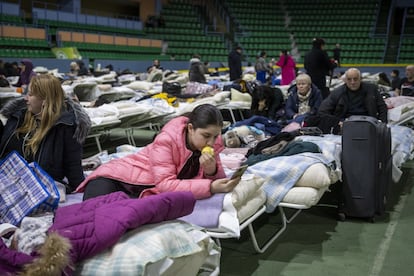Treatment of ethnic communities pits Ukraine against neighbors Romania and Hungary
Bucharest and Budapest have called for changes to a law limiting minority language teaching in schools and pointed out Kyiv’s EU membership bid rests on ethnic tolerance


The end of World War II left many eastern European peoples stranded in nations with very different languages. The Communist dictatorships that arose from 1945 onward succeeded in silencing this cultural melting pot for decades, but the new governments that emerged after the lifting of the iron curtain have for years been expressing their concern over the treatment their compatriots receive in neighboring countries. Following Moscow’s invasion of Ukraine, a country that considers the Russian language as one of the Kremlin’s tools of geopolitical expansion, this concern has intensified.
Both Romania and Hungary, which have large ethnic communities in Ukrainian territory, have reacted angrily to a new law governing minorities adopted by the Kyiv parliament on December 13, which largely ratifies legislation from 2017 that limits the amount of education schoolchildren will receive in their mother tongues. Until then, ethnic minorities in Ukraine had the right to study in their own languages at kindergarten, junior and high school level, with Ukrainian left on the margins. The law, which can yet be modified, also provides no guarantees that citizens will be attended to by public services in their own languages. In pre-war Ukraine, almost 600,000 people belonged to expatriate Moldovan, Romanian or Hungarian communities, according to the 2001 census.
The approval of the law, which was passed with 324 votes in favor and two abstentions, led Romanian President Klaus Iohannis to call his Ukrainian counterpart, Volodymyr Zelenskiy, in early January to ask that Kyiv “quickly identify solutions to address and remedy” Bucharest’s concerns over the legislation.
Zelenskiy, for his part, attempted to defuse the situation by agreeing to a meeting between the foreign ministers of the two countries while expressing his willingness to “identify solutions so that the Romanian community in Ukraine benefits from the same rights enjoyed by the Ukrainian community in Romania,” a press release from the Romanian presidency stated.
Zelenskiy had, however, previously ignored Romania’s requests to revise the law by promulgating it on December 30 without changes. Just a week earlier, Bucharest had urged Kiev to amend the legislation and to seek the input of the Venice Commission – the Council of Europe’s advisory body on constitutional affairs – when drafting it as, according to the Romanian government, it fails to meet European Union standards. The statement issued by the Romanian presidency even hinted that the issue could jeopardize Romania’s support for Ukraine’s EU membership bid.
The Ukrainian Constitutional Court ruled the law was constitutional in July 2021, on the basis that as Ukrainian was being studied as a second language by ethnic minorities, there was a low level of its use and comprehension. The court also noted that Russian is used as a “means of interethnic communication,” which left ethnic minorities “isolated from participation in public life and the democratic process.”
However, Aurica Bojescu, an expert in Romanian ethnic law, says that the new legislation represents a road departure “from the constitutional norm in which education in the mother tongue is guaranteed by the state.” Bojescu, who helped to draft the Ukrainian Constitution in 1996, fears the new law will lead to further marginalization of minorities in Ukrainian society. “An elite will no longer be formed in the Romanian community; from the schools will come students with simple trades such as craftsmen or mechanics, not intellectuals.”
According to the 2001 census, the last to be carried out in Ukraine, there are 151,000 citizens who identify as ethnic Romanian, with a further 260,000 who consider themselves ethnic Moldovan. To bring them together to form the third-largest ethnic group in Ukraine after Ukrainians and Russians, Bucharest has asked that the Moldovans be considered Romanian, given that Romania considers the creation of the Moldovan language and identity to be a Soviet artifice designed to dilute Romanian identity in territories claimed by Moscow in the 1939 Ribbentrop-Molotov pact signed between Nazi Germany and the Soviet Union.
Romania, which has taken in more than three million Ukrainian refugees since the outbreak of the war, of whom just over 100,000 have settled permanently in the country, insists that Kyiv make changes to the law aimed at restoring the rights of ethnic communities.
Budapest issues warning over “anti-Hungarian actions”
In contrast to the diplomatic language being deployed by Bucharest, on January 19, Hungary raised the tone by accusing Ukraine of “harassment” and “deprivation of rights” of the Magyar minority in the town of Mukachevo, located in the southwestern Transcarpathian region of the country. Foreign Ministry state secretary Tamás Menczer said that “anti-Hungarian actions are unacceptable” after Ukrainian authorities removed Hungarian flags from administrative buildings in two towns and a statue of great symbolic importance to Hungarians in Mukachevo was taken down. Local school principals and teachers of Hungarian descent were also fired and Hungarian symbols removed from institutions. “We very much trust that such anti-Hungarian actions will not be experienced elsewhere,” Menczer added. “We have called on local leaders in Mukachevo district to have the anti-Hungarian measures withdrawn and the status quo ante restored immediately.”
Hungarian Foreign Minister Peter Szijjártó accused Ukraine of making decisions that undermine the rights of the Hungarian community, which numbers around 156,000, and stressed that this will complicate Budapest’s support for Ukraine over the war, according to media outlet hirado.hu. Speaking at the EU Foreign Affairs Council, Szijjártó accused Ukraine of “concentrated and serious attacks” against the Hungarian community. “All this is unacceptable, and not only we Hungarians, but also the European Union, must be aware of this. It is unacceptable for anyone to portray this as a bilateral issue,” he said, adding that Ukraine must abide by EU rules if it wishes to join the common bloc.
Sign up for our weekly newsletter to get more English-language news coverage from EL PAÍS USA Edition
Tu suscripción se está usando en otro dispositivo
¿Quieres añadir otro usuario a tu suscripción?
Si continúas leyendo en este dispositivo, no se podrá leer en el otro.
FlechaTu suscripción se está usando en otro dispositivo y solo puedes acceder a EL PAÍS desde un dispositivo a la vez.
Si quieres compartir tu cuenta, cambia tu suscripción a la modalidad Premium, así podrás añadir otro usuario. Cada uno accederá con su propia cuenta de email, lo que os permitirá personalizar vuestra experiencia en EL PAÍS.
¿Tienes una suscripción de empresa? Accede aquí para contratar más cuentas.
En el caso de no saber quién está usando tu cuenta, te recomendamos cambiar tu contraseña aquí.
Si decides continuar compartiendo tu cuenta, este mensaje se mostrará en tu dispositivo y en el de la otra persona que está usando tu cuenta de forma indefinida, afectando a tu experiencia de lectura. Puedes consultar aquí los términos y condiciones de la suscripción digital.








































